Unit1 SectionA Grammar focus 3c 课件(人教新目标八年级上册Unit 1 Where did you go on vacation?)
文档属性
| 名称 | Unit1 SectionA Grammar focus 3c 课件(人教新目标八年级上册Unit 1 Where did you go on vacation?) | 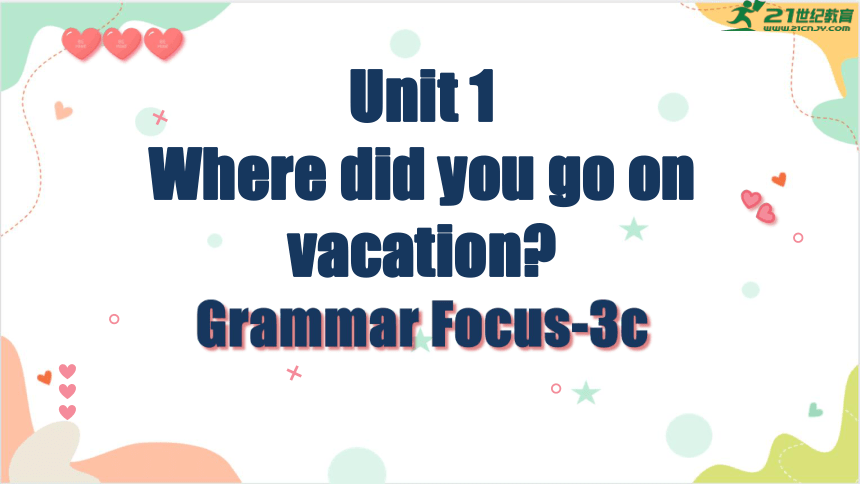 | |
| 格式 | pptx | ||
| 文件大小 | 8.2MB | ||
| 资源类型 | 试卷 | ||
| 版本资源 | 人教新目标(Go for it)版 | ||
| 科目 | 英语 | ||
| 更新时间 | 2023-08-29 17:14:39 | ||
图片预览

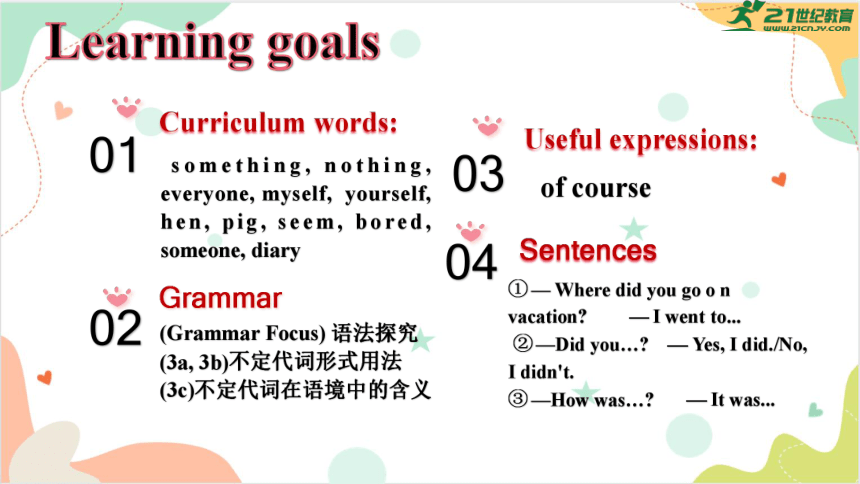
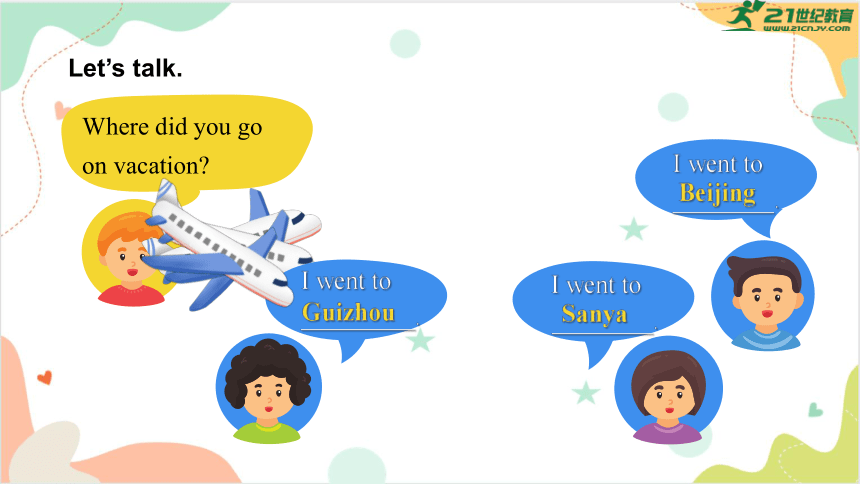

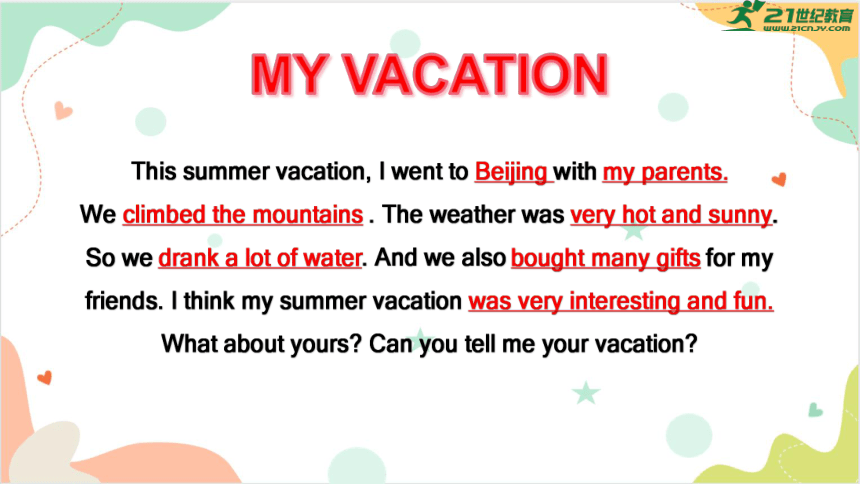
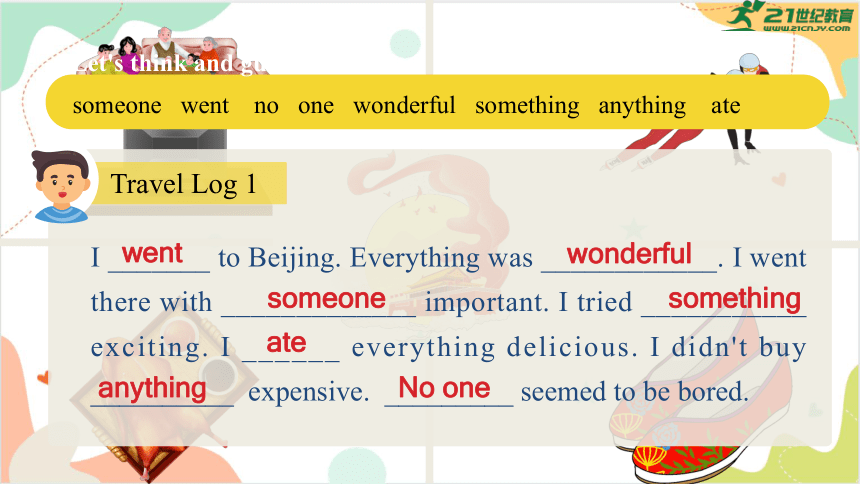
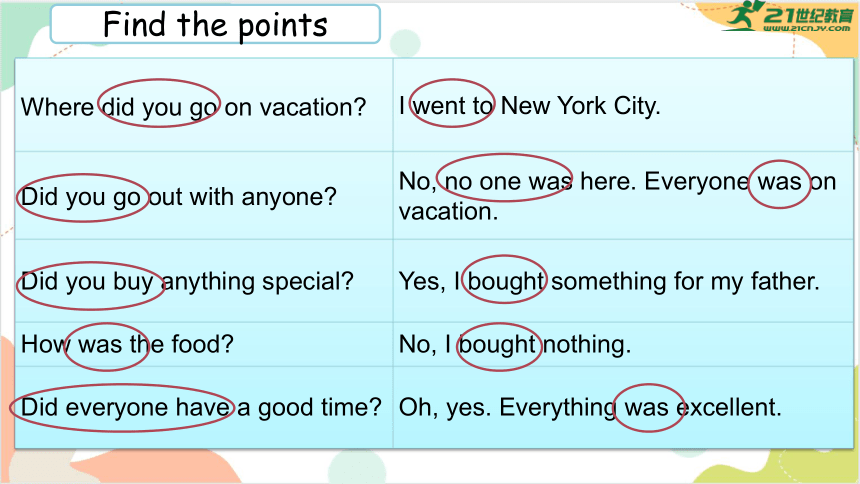
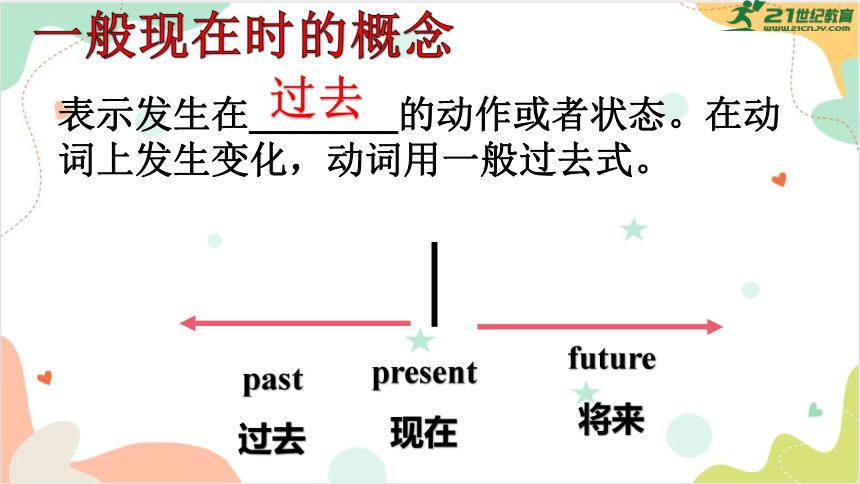
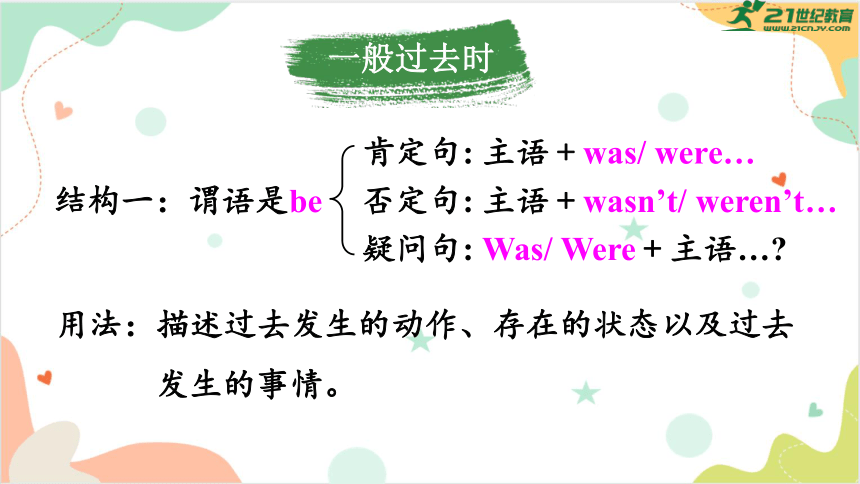
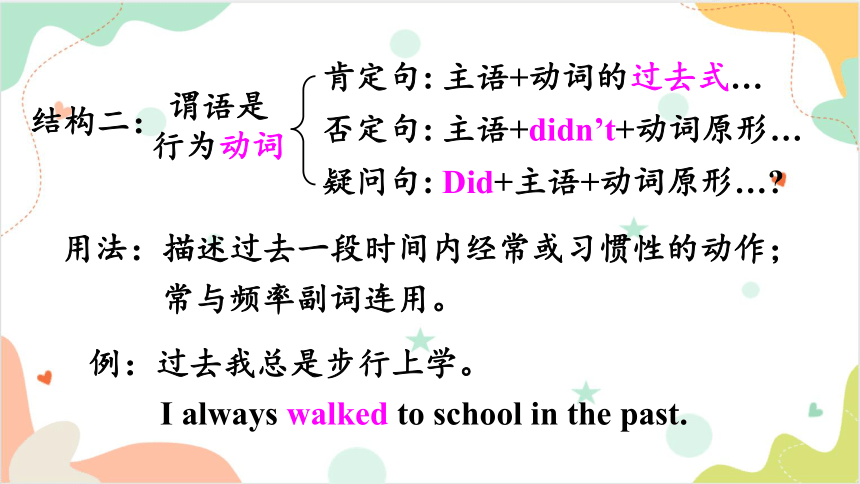
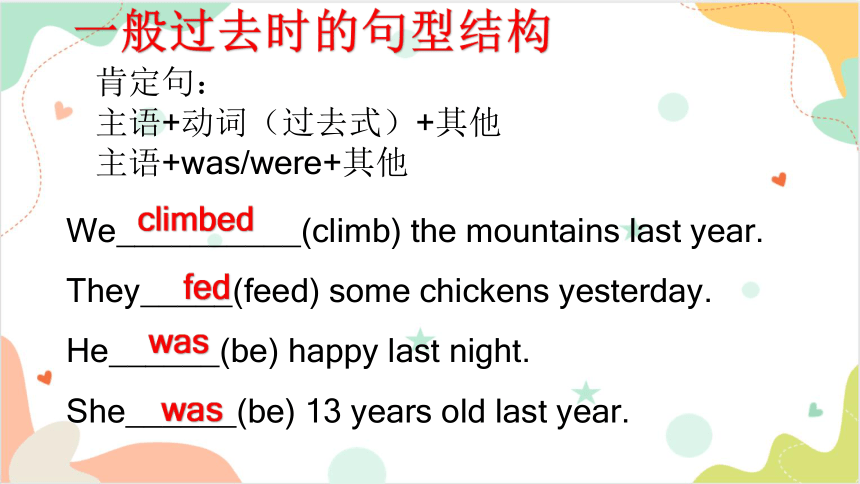
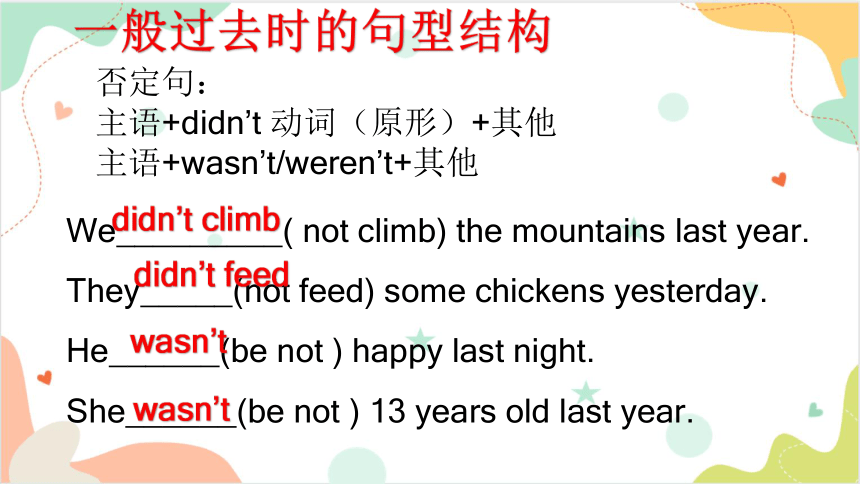
文档简介
(共30张PPT)
Unit 1
Where did you go on vacation
Grammar Focus-3c
+
+
01
Curriculum words:
Learning goals
something, nothing, everyone, myself, yourself, hen, pig, seem, bored, someone, diary
02
Grammar
(Grammar Focus) 语法探究
(3a, 3b)不定代词形式用法
(3c)不定代词在语境中的含义
03
Useful expressions:
of course
04
Sentences
① — Where did you go o n vacation — I went to...
② —Did you… — Yes, I did./No, I didn't.
③ —How was… — It was...
Where did you go on vacation
I went to ________.
Beijing
I went to _________.
Guizhou
I went to ________.
Sanya
Let’s talk.
Free talk
talk about your summer vacation
interesting
boring
felt
were
was
relaxing
went
saw
bought
ate
stayed
……
Use these words as much as possible!
This summer vacation, I went to Beijing with my parents.
We climbed the mountains . The weather was very hot and sunny.
So we drank a lot of water. And we also bought many gifts for my friends. I think my summer vacation was very interesting and fun.
What about yours Can you tell me your vacation
my vacation
Travel Log 1
I _______ to Beijing. Everything was ____________. I went there with _____________ important. I tried ___________ exciting. I ______ everything delicious. I didn't buy __________ expensive. _________ seemed to be bored.
someone went no one wonderful something anything ate
went
something
someone
anything
ate
No one
wonderful
Let's think and guess.
Where did you go on vacation I went to New York City.
Did you go out with anyone No, no one was here. Everyone was on vacation.
Did you buy anything special Yes, I bought something for my father.
How was the food No, I bought nothing.
Did everyone have a good time Oh, yes. Everything was excellent.
Find the points
present
现在
future
将来
past
过去
一般现在时的概念
表示发生在_______的动作或者状态。在动词上发生变化,动词用一般过去式。
过去
一般过去时
结构一:谓语是be
肯定句: 主语﹢was/ were…
否定句: 主语﹢wasn’t/ weren’t…
疑问句: Was/ Were﹢主语…
用法:描述过去发生的动作、存在的状态以及过去
发生的事情。
结构二:
例:过去我总是步行上学。
I always walked to school in the past.
肯定句: 主语+动词的过去式…
否定句: 主语+didn’t+动词原形…
疑问句: Did+主语+动词原形…
用法:描述过去一段时间内经常或习惯性的动作;
常与频率副词连用。
谓语是
行为动词
一般过去时的句型结构
肯定句:
主语+动词(过去式)+其他
主语+was/were+其他
We__________(climb) the mountains last year.
They_____(feed) some chickens yesterday.
He______(be) happy last night.
She______(be) 13 years old last year.
climbed
fed
was
was
否定句:
主语+didn’t 动词(原形)+其他
主语+wasn’t/weren’t+其他
We_________( not climb) the mountains last year.
They_____(not feed) some chickens yesterday.
He______(be not ) happy last night.
She______(be not ) 13 years old last year.
一般过去时的句型结构
didn’t climb
didn’t feed
wasn’t
wasn’t
Grammar Focus
I was in Beijing last month.
I went to Shanghai last Friday.
I wasn’t in Beijing last month.
I didn’t go to Shanghai last Friday.
—Were you in Beijing last month?
—Yes, I was. / No, I wasn’t.
—Did you go to Shanghai last Friday
—Yes, I did. / No, I didn’t.
肯定句
否定句
一般疑问句
be动词
行为动词
一般过去有规则,肯定句用过去式;
否定要把didn’t添,谓语动词须还原;
疑问did加在前,动词也要用原形。
Where did you go on vacation I went to New York City.
Did you go out with anyone No, no one was here. Everyone was on vacation.
Did you buy anything special Yes, I bought something for my father.
How was the food No, I bought nothing.
Did everyone have a good time Oh, yes. Everything was excellent.
Find the points
someone/somebody
I went to New York City.
No, no one was here. Everyone was on vacation.
Yes, I bought something for my father.
No, I bought nothing.
Oh, yes. Everything was excellent.
Circle all the indefinite pronouns, e.g. anyone, anything …
Circle all the indefinite pronouns, e.g. anyone, anything … and group them.
Where did you go on vacation
Did you go out with anyone
Did you buy anything special
How was the food
Did everyone have a good time
some-
any-
no-
every-
some/any/no/every/each/all …
For people For things
anyone
everyone
no one
someone
anything
something
nothing
everything
For people For things someone anyone something anything
everyone no one everything nothing
something, someone
anything, anyone
nothing, no one
everything, everyone
2.常见的复合不定代词
somebody 某人 someone 某人 something 某物,某事 anybody 任何人
anyone 任何人
anything 任何事物
nobody 没有人 no one 没有人 nothing 没有东西 everybody 每人
everyone 每人
everything
每一件事情;一切
复合不定代词
some(某些/个)
any(任何)
every (每一)
no(没有)
thing(事/物)
one (人)
body (人)
where (地点)
+
something
someone
somebody
somewhere
anything
anyone
anybody
anywhere
nothing
no one
nobody
nowhere
everything
everyone
everybody
everywhere
some-类不定代词 any-类不定代词
肯定句
疑问句
常用于肯定句
若any-类复合不定代词用于肯定句时,表示“随便哪个”
常用于疑问句中
Grammar Focus
For people
everyone
someone
anyone
no one
any +one
任何人
every + one
每人;人人
no one 要分开
没有人
some + one
某人
For things
nothing
something
anything
everything
some + thing
某事
every + thing
每件事,所有事
any + thing
任何事物
no + thing
没有什么
Fill in the blanks with the words in the box and practice the conversation.
Linda: Did you do ________ fun on your vacation, Alice
Alice: Yes, I did. I went to Sanya.
Linda: How did you like it
Alice: Well, it was my first time there, so __________
was really interesting.
anything
everything
3a
Linda: Did you go with ________
Alice: Yes, I did. I went with my sister.
Linda: Did you go shopping
Alice: Of course! I bought __________ for my parents,
but ________ for myself.
Linda: Why didn’t you buy _________ for yourself
Alice: I didn’t really see _________ I liked.
anyone
something
anything
nothing
anything
How do/did you like… “你觉得……怎样?”
用来询问对方的观点或看法
= What do/ did you think of…
=How do/ did you feel about…
go shopping: 去购物;去买东西
相当于do some shopping. (同义短语)
teach oneself 自学 = learn..by oneself自学
Eg: I teach myself English. 我自学英语。
I learn English by myself . 我自学英语。
enjoy oneself 玩得高兴
They enjoyed themselves. 他们玩得很开心.
(=They had a good time.)
by oneself 独自;独立
She looks after her little sister by herself.她独自照顾她的妹妹。
help oneself to sth. 自取/自用...;随便吃...
You can help yourself (to eat/drink) .
3b
Fill in the blanks in the e mail message with the words in the box.
Dear Bill,
How was your vacation Did you do _______interesting Did ______ in the family go with you
I went to a friend's farm in the countryside with my family.________ was great. We fed some hens and saw some baby pigs. They were so cute! The only problem was that there was ________ much to do in the evening but read. Still ________ seemed to be bored. Bye for now!
Mark
anything everything nothing everyone no one
anything
everyone
Everything
nothing
no one
Mike’s school trip ______ great. Where ______ she go She _______ (not go) to the zoo. She ______ (go) to a farm. On the farm, Carol ______ (milk) a cow and ______ (ride) a horse. ______ she feed chickens No, she ______. She only ______ (see) them.
In the afternoon, she ______ (take) some pictures of flowers. Then, she ______ (go) for a walk with her friends and ______ (talk) with a farmer.
was
did
didn’t go
went
milked
rode
didn’t
saw
took
went
Did
talked
... nothing but to do sth. 某人除了某事之外什么也没...。
此处的but表示“除了”,前有实义动词do时but后的不定式需省略to
Eg: I do nothing but play on the phone.
我除了玩手机什么也没干。
Eg: My teacher tells me nothing but to keep on.
我的老师除了对我说坚持,其他什么都没说。
1. ...there was nothing much to do in the evening but read.
Language Points
Language Points
seem[si m] v.好像;似乎;看来, 常见搭配有:
(1) 主语+seem+形容词 ... 看起来好像
Eg: She seemed sad.
(2) seem to do sth 似乎要做某事
Eg: She seemed to be sad.
(3) It seems that+从句 似乎...
Eg: It seemed that she was sad.
2. Still no one seemed to be bore.
Did you… Everyone Someone (name) No one
eat anything at a restaurant
read anything interesting
visit anyone in your family
buy anything
keep a diary
Ask your group questions about their last vacation. Then tell the class your results.
n. 日记;记事薄
keep a diary 记日记
-Did you eat anything at a restaurant, Rick/Helen/Grace
-Did you read anything intersting, Rick/Helen/Grace
Show Time
report:
In our group, everyone/someone/no one ate something at a restaurant~
一. 用所给动词的适当形式填空。
We ______ (live) in Japan last year.
Jack________ (stop) the car last Sunday.
Tom _______ (clean) his room and ________ (study) for the Chinese test last weekend.
4.What ______ you ______(do) last night
5.On Sunday morning I _______ (play) tennis.
lived
stopped
cleaned
studied
did
do
played
二、句型转换。
It was hot and wet yesterday.(改否定句)
I was at home the day before yesterday. (变一般疑问句)
Lucy did her homework at home. (改否定句)
She went to the beach last Sunday.(变一般疑问句)
It ______ hot and wet yesterday.
Lucy ___________ her homework at home.
______ she ______ to the beach last Sunday
wasn't
didn't do
Did go
______ you at home the day before yesterday
Were
Thanks
Unit 1
Where did you go on vacation
Grammar Focus-3c
+
+
01
Curriculum words:
Learning goals
something, nothing, everyone, myself, yourself, hen, pig, seem, bored, someone, diary
02
Grammar
(Grammar Focus) 语法探究
(3a, 3b)不定代词形式用法
(3c)不定代词在语境中的含义
03
Useful expressions:
of course
04
Sentences
① — Where did you go o n vacation — I went to...
② —Did you… — Yes, I did./No, I didn't.
③ —How was… — It was...
Where did you go on vacation
I went to ________.
Beijing
I went to _________.
Guizhou
I went to ________.
Sanya
Let’s talk.
Free talk
talk about your summer vacation
interesting
boring
felt
were
was
relaxing
went
saw
bought
ate
stayed
……
Use these words as much as possible!
This summer vacation, I went to Beijing with my parents.
We climbed the mountains . The weather was very hot and sunny.
So we drank a lot of water. And we also bought many gifts for my friends. I think my summer vacation was very interesting and fun.
What about yours Can you tell me your vacation
my vacation
Travel Log 1
I _______ to Beijing. Everything was ____________. I went there with _____________ important. I tried ___________ exciting. I ______ everything delicious. I didn't buy __________ expensive. _________ seemed to be bored.
someone went no one wonderful something anything ate
went
something
someone
anything
ate
No one
wonderful
Let's think and guess.
Where did you go on vacation I went to New York City.
Did you go out with anyone No, no one was here. Everyone was on vacation.
Did you buy anything special Yes, I bought something for my father.
How was the food No, I bought nothing.
Did everyone have a good time Oh, yes. Everything was excellent.
Find the points
present
现在
future
将来
past
过去
一般现在时的概念
表示发生在_______的动作或者状态。在动词上发生变化,动词用一般过去式。
过去
一般过去时
结构一:谓语是be
肯定句: 主语﹢was/ were…
否定句: 主语﹢wasn’t/ weren’t…
疑问句: Was/ Were﹢主语…
用法:描述过去发生的动作、存在的状态以及过去
发生的事情。
结构二:
例:过去我总是步行上学。
I always walked to school in the past.
肯定句: 主语+动词的过去式…
否定句: 主语+didn’t+动词原形…
疑问句: Did+主语+动词原形…
用法:描述过去一段时间内经常或习惯性的动作;
常与频率副词连用。
谓语是
行为动词
一般过去时的句型结构
肯定句:
主语+动词(过去式)+其他
主语+was/were+其他
We__________(climb) the mountains last year.
They_____(feed) some chickens yesterday.
He______(be) happy last night.
She______(be) 13 years old last year.
climbed
fed
was
was
否定句:
主语+didn’t 动词(原形)+其他
主语+wasn’t/weren’t+其他
We_________( not climb) the mountains last year.
They_____(not feed) some chickens yesterday.
He______(be not ) happy last night.
She______(be not ) 13 years old last year.
一般过去时的句型结构
didn’t climb
didn’t feed
wasn’t
wasn’t
Grammar Focus
I was in Beijing last month.
I went to Shanghai last Friday.
I wasn’t in Beijing last month.
I didn’t go to Shanghai last Friday.
—Were you in Beijing last month?
—Yes, I was. / No, I wasn’t.
—Did you go to Shanghai last Friday
—Yes, I did. / No, I didn’t.
肯定句
否定句
一般疑问句
be动词
行为动词
一般过去有规则,肯定句用过去式;
否定要把didn’t添,谓语动词须还原;
疑问did加在前,动词也要用原形。
Where did you go on vacation I went to New York City.
Did you go out with anyone No, no one was here. Everyone was on vacation.
Did you buy anything special Yes, I bought something for my father.
How was the food No, I bought nothing.
Did everyone have a good time Oh, yes. Everything was excellent.
Find the points
someone/somebody
I went to New York City.
No, no one was here. Everyone was on vacation.
Yes, I bought something for my father.
No, I bought nothing.
Oh, yes. Everything was excellent.
Circle all the indefinite pronouns, e.g. anyone, anything …
Circle all the indefinite pronouns, e.g. anyone, anything … and group them.
Where did you go on vacation
Did you go out with anyone
Did you buy anything special
How was the food
Did everyone have a good time
some-
any-
no-
every-
some/any/no/every/each/all …
For people For things
anyone
everyone
no one
someone
anything
something
nothing
everything
For people For things someone anyone something anything
everyone no one everything nothing
something, someone
anything, anyone
nothing, no one
everything, everyone
2.常见的复合不定代词
somebody 某人 someone 某人 something 某物,某事 anybody 任何人
anyone 任何人
anything 任何事物
nobody 没有人 no one 没有人 nothing 没有东西 everybody 每人
everyone 每人
everything
每一件事情;一切
复合不定代词
some(某些/个)
any(任何)
every (每一)
no(没有)
thing(事/物)
one (人)
body (人)
where (地点)
+
something
someone
somebody
somewhere
anything
anyone
anybody
anywhere
nothing
no one
nobody
nowhere
everything
everyone
everybody
everywhere
some-类不定代词 any-类不定代词
肯定句
疑问句
常用于肯定句
若any-类复合不定代词用于肯定句时,表示“随便哪个”
常用于疑问句中
Grammar Focus
For people
everyone
someone
anyone
no one
any +one
任何人
every + one
每人;人人
no one 要分开
没有人
some + one
某人
For things
nothing
something
anything
everything
some + thing
某事
every + thing
每件事,所有事
any + thing
任何事物
no + thing
没有什么
Fill in the blanks with the words in the box and practice the conversation.
Linda: Did you do ________ fun on your vacation, Alice
Alice: Yes, I did. I went to Sanya.
Linda: How did you like it
Alice: Well, it was my first time there, so __________
was really interesting.
anything
everything
3a
Linda: Did you go with ________
Alice: Yes, I did. I went with my sister.
Linda: Did you go shopping
Alice: Of course! I bought __________ for my parents,
but ________ for myself.
Linda: Why didn’t you buy _________ for yourself
Alice: I didn’t really see _________ I liked.
anyone
something
anything
nothing
anything
How do/did you like… “你觉得……怎样?”
用来询问对方的观点或看法
= What do/ did you think of…
=How do/ did you feel about…
go shopping: 去购物;去买东西
相当于do some shopping. (同义短语)
teach oneself 自学 = learn..by oneself自学
Eg: I teach myself English. 我自学英语。
I learn English by myself . 我自学英语。
enjoy oneself 玩得高兴
They enjoyed themselves. 他们玩得很开心.
(=They had a good time.)
by oneself 独自;独立
She looks after her little sister by herself.她独自照顾她的妹妹。
help oneself to sth. 自取/自用...;随便吃...
You can help yourself (to eat/drink) .
3b
Fill in the blanks in the e mail message with the words in the box.
Dear Bill,
How was your vacation Did you do _______interesting Did ______ in the family go with you
I went to a friend's farm in the countryside with my family.________ was great. We fed some hens and saw some baby pigs. They were so cute! The only problem was that there was ________ much to do in the evening but read. Still ________ seemed to be bored. Bye for now!
Mark
anything everything nothing everyone no one
anything
everyone
Everything
nothing
no one
Mike’s school trip ______ great. Where ______ she go She _______ (not go) to the zoo. She ______ (go) to a farm. On the farm, Carol ______ (milk) a cow and ______ (ride) a horse. ______ she feed chickens No, she ______. She only ______ (see) them.
In the afternoon, she ______ (take) some pictures of flowers. Then, she ______ (go) for a walk with her friends and ______ (talk) with a farmer.
was
did
didn’t go
went
milked
rode
didn’t
saw
took
went
Did
talked
... nothing but to do sth. 某人除了某事之外什么也没...。
此处的but表示“除了”,前有实义动词do时but后的不定式需省略to
Eg: I do nothing but play on the phone.
我除了玩手机什么也没干。
Eg: My teacher tells me nothing but to keep on.
我的老师除了对我说坚持,其他什么都没说。
1. ...there was nothing much to do in the evening but read.
Language Points
Language Points
seem[si m] v.好像;似乎;看来, 常见搭配有:
(1) 主语+seem+形容词 ... 看起来好像
Eg: She seemed sad.
(2) seem to do sth 似乎要做某事
Eg: She seemed to be sad.
(3) It seems that+从句 似乎...
Eg: It seemed that she was sad.
2. Still no one seemed to be bore.
Did you… Everyone Someone (name) No one
eat anything at a restaurant
read anything interesting
visit anyone in your family
buy anything
keep a diary
Ask your group questions about their last vacation. Then tell the class your results.
n. 日记;记事薄
keep a diary 记日记
-Did you eat anything at a restaurant, Rick/Helen/Grace
-Did you read anything intersting, Rick/Helen/Grace
Show Time
report:
In our group, everyone/someone/no one ate something at a restaurant~
一. 用所给动词的适当形式填空。
We ______ (live) in Japan last year.
Jack________ (stop) the car last Sunday.
Tom _______ (clean) his room and ________ (study) for the Chinese test last weekend.
4.What ______ you ______(do) last night
5.On Sunday morning I _______ (play) tennis.
lived
stopped
cleaned
studied
did
do
played
二、句型转换。
It was hot and wet yesterday.(改否定句)
I was at home the day before yesterday. (变一般疑问句)
Lucy did her homework at home. (改否定句)
She went to the beach last Sunday.(变一般疑问句)
It ______ hot and wet yesterday.
Lucy ___________ her homework at home.
______ she ______ to the beach last Sunday
wasn't
didn't do
Did go
______ you at home the day before yesterday
Were
Thanks
同课章节目录
- Unit 1 Where did you go on vacation?
- Section A
- Section B
- Unit 2 How often do you exercise?
- Section A
- Section B
- Unit 3 I'm more outgoing than my sister.
- Section A
- Section B
- Unit 4 What's the best movie theater?
- Section A
- Section B
- Unit 5 Do you want to watch a game show?
- Section A
- Section B
- Unit 6 I'm going to study computer science.
- Section A
- Section B
- Unit 7 Will people have robots?
- Section A
- Section B
- Unit 8 How do you make a banana milk shake?
- Section A
- Section B
- Unit 9 Can you come to my party?
- Section A
- Section B
- Unit 10 If you go to the party, you'll have a grea
- Section A
- Section B
